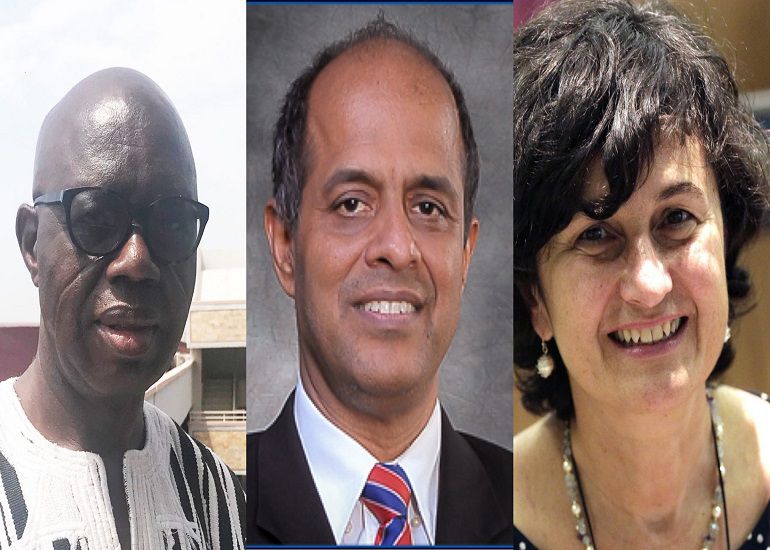Saa Dittoh, Narayanan Kulathuramaiyer, and Anna Bon: “Digital Society, Social Justice and Academic Education”
"This panel focuses on how digital technologies' ethical and social aspects can be handled adequately in academic research."

March 23rd 2021
- 17:00 – 18:30 CET
-
This is an online-only event.
See description for details.
On This Page
- Panelists:
Saa Dittoh, UDS, Ghana
Narayanan Kulathuramaiyer, UNIMAS, Malaysia
Anna Bon, VU Amsterdam, the Netherlands - Moderator: Hans Akkermans, w4ra.org, the Netherlands
About the Event
March 23, 2021
5:00 – 6:30 PM
(17:00) CET
Abstract
An important open question of Digital Humanism is how ethical and social aspects of digital technologies and associated matters of human values and social justice can be properly handled in academic research and education. An approach, also discussed in preceding DigHum Lectures, is to create interdisciplinary courses on ethics and/or philosophy of technology such as “Tech Ethics”. This panel investigates approaches that have their roots in direct collaboration from academia with outside (underprivileged, marginalized) communities as integral element of research and education. Case examples and experiences from three different continents are discussed, which also gives some perspective on the simultaneous universality and contextuality of issues of human values and social justice.
Talks
Knowledge for Service: Digital Technology Positives and Negatives in African Rural Societies Saa Dittoh
Many decades ago (and possibly now in some areas) in rural Africa, communal methods of information sharing were not always face-to-face; some were virtual, through high-pitched voices and/or loud sounding “talking drums” that gave “coded information”. No wonder that many African rural societies have no reservations adopting appropriate modern digital technologies. The rapid advance in digital technology has been positive in many ways but there are several negative and damaging aspects that threaten the values, cultures and even the very existence of some African rural societies. In this talk I discuss those threats and suggests ways to counter them. This talk further highlights how knowledge can be put to service and how university students can be engaged in this.
Digital Sociotechnical Innovation and Indigenous Knowledge
Narayanan Kulathuramaiyer
In this talk I will discuss how university research and education on digital technology can be a factor in empowering under-served communities. In particular I describe the eBario program as a long-standing university-community partnership between the rural Kelabit community, one of Borneo ethnic minorities, and the University Malaysia Sarawak. This program to bridge the digital divide started in 1998, the indigenous Kelabit community taking on the information and knowledge creation pathway as a way forward. The program has over the past two decades evolved to become recognized as a living laboratory, influencing practice and policy, with for example a role in poverty reduction. eBario as an ICT for Development model has been replicated to cover eight other sites across Peninsula and East Malaysian states of Sabah and Sarawak. The biggest achievement however resides in the development of community scholars and the community-led life-long-learning initiatives that go on till today.
Digital Divide, Inclusion and Community Service Learning
Anna Bon
Community service learning (CSL) is an educational approach that we have further developed in collaboration with universities and stakeholders in the Global South into a research and education model dubbed: ICT4D 3.0. This model combines problem-solving and situational learning with meaningful service to communities and society. In computer science and artificial intelligence education – traditionally purely technologically oriented – ICT4D 3.0 integrates CSL’s societal and ethical principles with user-centered design and socio-technical problem-solving. Being exposed to complex, societal real world problems, students learn by exploring, reflecting, co-designing in close interaction with communities in a real world environment. This type of education provides a rich learning environment for “Bildung”.
Slides
Here you can download the slides:
Saa Dittoh
Narayanan Kulathuramaiyer
Anna Bon
Hans Akkermans
Video
If you watch this video, data may be transmitted to third parties.
Watch on YouTube: https://youtu.be/CDQNhNgDyvk

